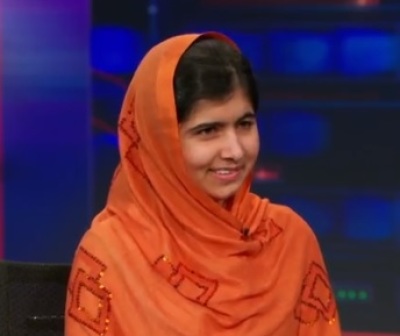Muslim Girl, Malala Yousafzai Deserves Nobel Peace Prize for Her Courageous Stand
"Let us pick up our books and pens. They are our most powerful weapons. One child, one teacher, one pen and one book can change the world. Education is the only solution. Education first!"

That rallying cry was the conclusion of a speech before the U.N. General Assembly last July by Malala Yousafzai. But this was no ordinary call for better schools, of the kind that is heard with increasing regularity today in America.
Malala is the Pakistani teenager shot in the head by the Taliban in October 2012 for advocating the education of girls in her homeland. Thursday she won the European Parliament's prestigious Sakharov Prize for her courage. The world waits to see if, on Friday, October 11, she will also become a Nobel Peace Laureate, too.
Malala Yousafzai's example in standing against Islamist extremism has few parallels.
The 16-year-old Muslim girl deserves these accolades, and more. Her example in standing against Islamist extremism has few parallels. Hunted down by name in a school bus and shot through the left eye socket by her would-be assassins, she was recently threatened again to shut up by the Taliban. Malala remains undaunted.
Her medical recovery has been miraculous but her persistent cry for education, even more so.
When Malala calls out for education, she, of course, is referring to a modern education, one that includes math and science and also arts and letters. That is what she was able to study and so valued in the private girls' school she attended in her native town in the Swat Valley, a neighborhood school established by her father.
In growing parts of the Muslim world – Saudi Arabia, Afghanistan and in northern Nigeria, for example -- what we would call a "good" education is considered a sin and to dissent from this view, a form of blasphemy. (Ironically, the Taliban takes its name from the Pashto word for "students.").
As Malala notes, not only girls, but boys, too, in many parts of the Muslim world, are deprived of such modern education. Students are taught by rote memorization, and discouraged from thinking for themselves.
The religious courses that constitute a large part of their curriculum are in some places taught from books and by teachers promoting religious bigotry and violence.
For example, in 2011, the US Commission on International Religious Freedom released a study, concluding that Pakistan's public schools "reinforce biases which fuel acts of discrimination, and possibly violence, against [religious minority] communities."
This independent U.S. agency's study also made the alarming finding: All the Pakistani public school teachers interviewed believed the concept of jihad to refer to violent struggle, compulsory for Muslims to engage in against the "enemies of Islam." And, moreover, "as many as 80 percent of the respondents considered non-Muslims to be enemies of Islam," despite contradictory views expressed in other parts of the interviews. At the U.N., Malala concluded with an appeal our Western foreign policy makers should take to heart:
"We must not forget that millions of children are out of their schools. We must not forget that our sisters and brothers are waiting for a bright, peaceful future. So let us wage a glorious struggle against illiteracy, poverty and terrorism."
Hers is an urgent message. Pakistan, and other parts of the Muslim world are in dire need of investment in their human capital. All our futures depend on it.






















